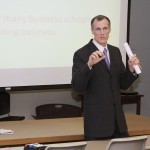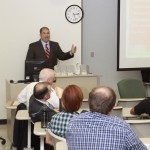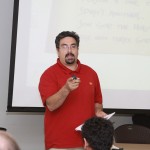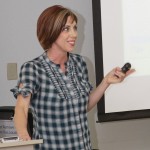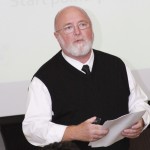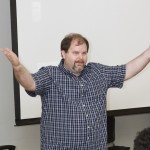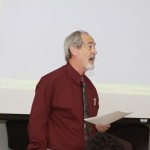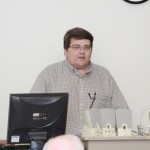A wide range of topics was covered Tuesday afternoon by speakers at the fourth research colloquium sponsored by the Honor Societies of Grand Canyon University.
Eight presentations were made in a little more than two hours at the Williams Building lecture hall. The colleges of Business, Doctoral Studies, Liberal Arts, Health Sciences and Fine Arts and Production were represented. Dr. Kevin McClean of the Ken Blanchard College of Business served as host.
The speakers, their colleges and their topics:
Olivier Bouclier, Ken Blanchard College of Business, “Executive Education: Rapprochement and Clash of Science and Practice.” Bouclier spoke of how executive education has come to be seen as excessively academic, irrelevant and expensive, after years of being a “cash cow” for a number of elite business schools. His doctoral research through Case Western Reserve University is looking at how collaboration affects individual and team success.
Nicholas Markette, College of Doctoral Studies, “A Case Study of the Structures and Conditions of Public High School Administrations as Teams.” Markette found that at the metropolitan Phoenix high school he studied, there was a clear and compelling direction and a culture of providing the best opportunities for success. Leadership training for principals, he said, should incorporate aspects of vision and culture.
Sanjay Merchant, College of Liberal Arts, “The Trinity and the Identity of Indiscernibles.” Merchant tackled a philosophical question — “If all properties are in common, then what individuates them?” — and applied it to the Trinity of Father, Son and Holy Spirit, noting that there is “unity without numerical identity.”
Susannah Keita, College of Fine Arts and Production, “A Metacognitive Approach to Dance Education.” Keita plans to follow her dance program’s seven freshmen through their four years at GCU, exploring the intellectual demands placed on artists and paying special attention to activities that encourage self-reflexivity, divergent thinking and problem solving.
Timothy Larkin, College of Liberal Arts, “Everyday Religion and the Christian University Student.” Larkin’s preliminary findings indicate that religion is seen as an “outward” activity and spirituality as an “inward” activity. Consistently, students say “intention of the heart” is the biggest factor in their spirituality.
Thomas Pirtle, College of Health Sciences, “How a Hyperpolarization-Activated Cation Current Alters Swimming Speed in the Pteropod Mollusk Clione Limacine.” Pirtle has extensively studied the behavior of the Clione limacine (or “sea angel”), which generally lives in cold waters and alters its nearly constant swimming motion depending on the proximity of its prey.
Michael Baird, College of Liberal Arts, “Bible Interpretation: A Holistic Approach.” The best interpretation of Scripture, Baird said, involves the integration of author, text and reader. This way, the text becomes a subject and not an object, and it can be seen in its fullest context.
Larry Barron, College of Liberal Arts, “Ratings of Funniness or Offensiveness in Judeo-Christian Denominational Jokes.” Barron examined three theories of humor — superiority, tension relief and incongruity — and applied them to 10 non-offensive denominational jokes in collaborative research with Bruce Glenn of Arizona State University. They found that the latter two theories were well-supported, although the first one was not.

